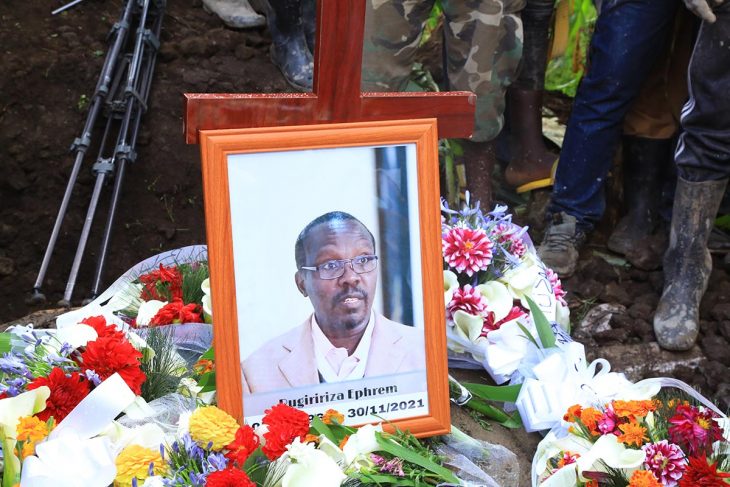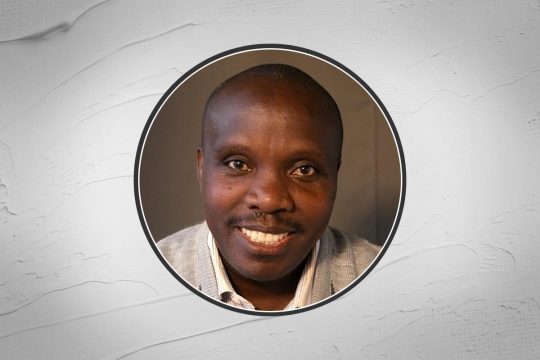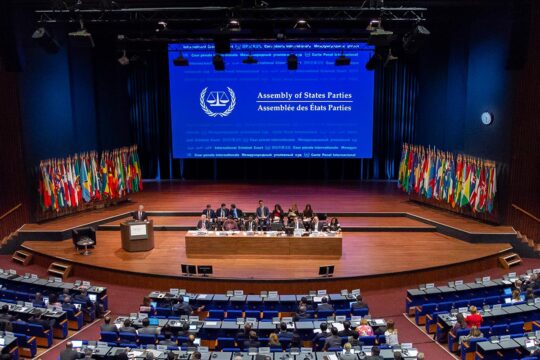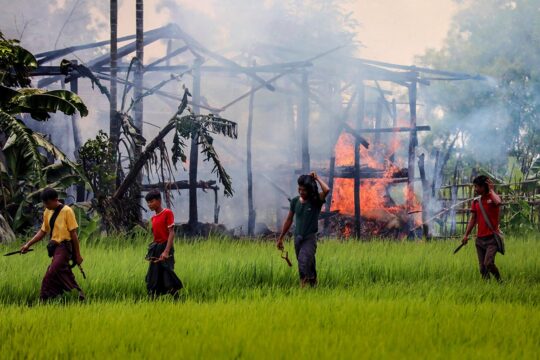"In life, you always have that one person whose path was different, with whom you were not even close friends in the true sense of the word, but who, along the way, gives you another perspective on things. And that changes you. For me it was Ephrem Rugiririza, whom I had listened to since childhood on the French-language news [on Radio Rwanda] and whom I met in Arusha [headquarters of the International Criminal Tribunal for Rwanda ICTR] in 2010 for training on judicial reporting organized by Fondation Hirondelle. Since then, I've become interested in it for good," says Fulgence Niyonagize, currently a journalist at Pax Press. "I remember the way he spoke slowly but every word carried weight, and those moments of sharing in Arusha, with Ephrem making sure that I learn [and] that I return safely after the training. Oh yes, I remember that! And now, the unexpected moment has come, and he is gone, our Ephrem. Absent from this world but always present in my memory."
Born on January 5, 1964, Ephrem joined Radio Rwanda in 1991, at the same time as Justice Info’s Rwanda correspondent Emmanuel Sehene Ruvugiro, who paid him a powerful personal tribute on December 3, the day Ephrem’s body was returned to the land of his forefathers. At the beginning of the 1990s, Rwanda was already plunged into civil war and at the same time undergoing democratization, while extremists of what was soon to be called "Hutu Power" were mobilizing. This was a movement of people who wanted to exterminate the Tutsis, a plan they would carry out three years later. There are probably only a handful of Rwandan journalists who experienced this terrible period without being killed, without becoming a killer, and without ever abandoning their profession. This was Ephrem Rugiririza’s exceptional story -- that of an outstanding journalist caught up in an unprecedented national cataclysm who never lost his moral compass, his rigour and independence, nor his dedication to his profession. It was a tour de force for this son of a Hutu farmer from northern Rwanda who had become passionate about information as well as languages -- Kinyarwanda, Swahili and French.
“Like good music”
"If today I speak good French, it is because he contributed greatly to it, he who was a true scientist and couldn’t help laughing at his literary professional career. He was a genius!" says Solange Ayanone, who first met him at Ruhengeri secondary school where Ephrem taught French. "In class, no one wanted to miss his lessons: we were happy to see such an energetic, passionate teacher who loved French and made us love it ourselves." Solange recalls the "indelible mark" left by "his knowledge and his human qualities".
Ephrem later welcomed Solange to the French section of Radio Rwanda. "When I was teaching you, you didn't know that French was going to be so useful," he told her. "He supported me throughout the beginning of my career as a journalist, happy to take his former pupil in hand! When he presented the news, it was not so much the content that interested me, but his art of presenting. It was always a lively edition in which he put all his energy and art, like good music. It was this man, she says, who "contributed a lot to who I am today”.
“Calm, lucid and hard-working”
Khassim Yussuf joined Radio Rwanda at the same time as Ephrem. After working with him at the Rwandan Information Office (Orinfor), Ephrem was his supervisor at Agence France Presse in Kigali. He speaks of "a man with a big heart, always listening to others, very magnanimous". Journalist Barore Cleophas worked with Ephrem in the aftermath of the genocide. "I recognized in him a calm, lucid, helpful and hardworking man. He did not like to hustle people but could tolerate all temperaments. At first seemingly quite introverted, he was more open than we thought, but generally calm,” says Kennedy Ndahiro who was his colleague at the Hirondelle News Agency, where they covered the ICTR trials in Tanzania. Ephrem was a key journalist there for more than a decade, starting in 2003. Now executive director of The New Times newspaper in Rwanda, Kennedy remembers "a very studious man, very supportive, very humble but very smart. He had an alert mind and liked to do research. We have lost a good man and an outstanding professional."
What could have been more sensitive, more delicate, than covering these genocide trials with rigour, clarity of vision and open-mindedness? In 2015, Hirondelle News Agency closed as the ICTR closed its hearings in Arusha, but Ephrem immediately joined Justice Info, a website created by the same Fondation Hirondelle to cover transitional justice around the world. Ephrem had become the most experienced and sharpest African journalist in this field. He was the Africa hub of this news site. And he continued to train journalists across the continent to cover these difficult and terribly human cases.
“Where in the east do you live? Goma, Rutshuru, Butembo?”
Among them is Claude Sengenya, a young reporter based in Butembo, eastern Democratic Republic of Congo, a region scarred by armed groups and epidemics. "No sooner had I submitted my three proposals [for articles] than I received the reaction of a man who struck me with his knowledge of my area: 'Nice to meet you. Where do you live in the East? Goma, Rutshuru, Butembo?', Ephrem Rugiririza asked me. I was reassured that I was working with an experienced journalist who had a good grasp of my volatile Kivu region. When I reported on the hope raised by military justice in dealing with mass crimes in the Congo, on the link between war and environmental crimes in Kivu, on the difficult search for justice and truth by specialized tribunals in the Central African Republic or in Gambia, Ephrem had this well-informed eye that allowed him to look at the facts in all their facets, to cross-check them with sources in his rich address book. Sometimes Ephrem would give me an interesting source who lived in my region without my knowledge! This knowledge coupled with rigour led Ephrem to push me further for the smallest details to make the transitional justice process in my country understandable. I was convinced that Ephrem held a truth about the crimes of the Great Lakes, a truth that we read in his articles. Ephrem's death means loss of a witness to the truth, because in the course of his work as a journalist, Ephrem listened to and reconstructed the testimonies of victims, witnesses and executioners. Ephrem's death is also the loss of a key to the truth, especially about the crimes in the Great Lakes region of Africa. We have lost a pillar, a man of rigour, available to teach us young people in our careers. I would have liked to see him read this message in which I say to him in Kiswahili, which we sometimes liked to speak to each other: shukrani Mzee Ephrem kwa mema yote uliyo tu tendeya - thank you, dear Ephrem, for all the blessings – and he would reply to me, as in one of his first e-mails, aksanti mdogo wangu - thank you, my young brother.”
Intellectually and ethically demanding
Covering mass crimes and the trials of those accused requires listening to all voices. Ephrem did indeed have a rich address book, as Claude says, but he was also respected by all parties, victims' advocates as well as prosecutors, defence lawyers and experts. "Those close to him and his colleagues will remember his sensitivity, his listening skills, his understanding and his discretion. In choosing to specialize in post-genocide criminal justice issues, he set the bar very high in terms of intellectual, deontological and ethical standards. To this end, he chose to work for independent structures, the price of freedom. His proximity to the field and his intimate knowledge of judicial cases related to the war, the genocide of the Tutsis in Rwanda, and more globally to African conflicts, drove him continuously. His numerous articles illustrate his vast knowledge of national and regional judicial contexts, his intimate and motivated perception of the multiple issues that underlie the strengths and failures of this field," writes sociologist André Guichaoua, a researcher on Rwanda and the sub-region as well as an expert witness in numerous trials on the 1994 genocide. "His priority was not to give an account of the comparative performance or lack thereof of judicial policies. Instead, he retained the lessons that would allow us to understand the genesis and the reasons for the criminal policies that have been inflicted on so many countries, and he constantly reminded us that it is the judicial institutions’ responsibility to defend the rule of law, to promote the conditions of a lasting peace by establishing the basis of a plural society and a shared history. (...) Out of humility, he wanted to be a demanding servant of the Truth as it emerged in his eyes from investigations, testimonies and judicial decisions. He thus reminded us that telling the truth (Veritatem dicere) is the essence of Justice. In this conviction lies the strength of his analyses and the scope of his contribution.”
“Ça va un peu…”
Every Monday, the five members of the Justice Info editorial team, scattered in different cities and countries, meet in an editorial conference via Skype. Ephrem lived in Kampala, where his three children have completed or continue their brilliant studies. His health problems often punctuated the beginning of the session.
- Comment ça va, Ephrem? (How are you?)
- Ça va un peu (not too bad), he would reply with that typical regional phrase, so you could never tell if it was just a turn of phrase or a source of concern.
It sometimes put us in a good mood sometimes worried us. On Monday, November 29, there was no particular reason to be more worried. The rooster in his yard was crowing as usual, giving the conference its rural tune. The shaky Internet connection added to our strange virtual companionship. “I can still see your smile, which could light up a room, and hear your voice. You were an illuminating presence and our reality check,” writes Julia Crawford, journalist and English translator for Justice Info who worked with Ephrem for more than a decade. “Whether you knew it or not, you were an exceptional African journalist, an invaluable colleague in good times and bad. You were a pillar of Fondation Hirondelle and Justice Info, of wisdom, generosity and professionalism right up to the last.” Ephrem now rests in the land to which he was viscerally attached, in Musanze, in the heart of the majestic Rwandan mountains. It is here that his wife lives, where he always returned and where he should have already fully retired if his devotion to his children and his passion for work had not made him extend his stay in Uganda. "I will always remember him saying that 'he who has not climbed up the mountain will not see the valley'," says his old colleague Aimable Twahirwa. So, as Fulgence Niyonagize says, "may the earth of your ancestors be light upon you, dear Ephrem".
If you wish to participate in the "Leetchi fund" set up for the benefit of Ephrem's family, to support them in their grief, click on the following link: https://www.leetchi.com/c/ephrem-fh







